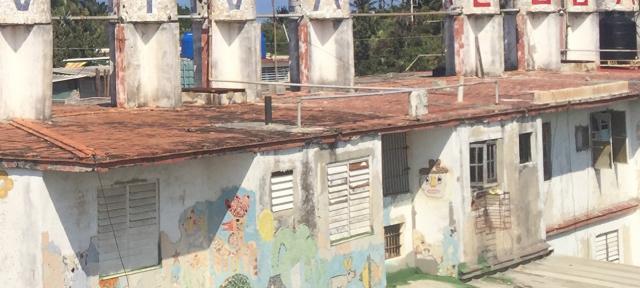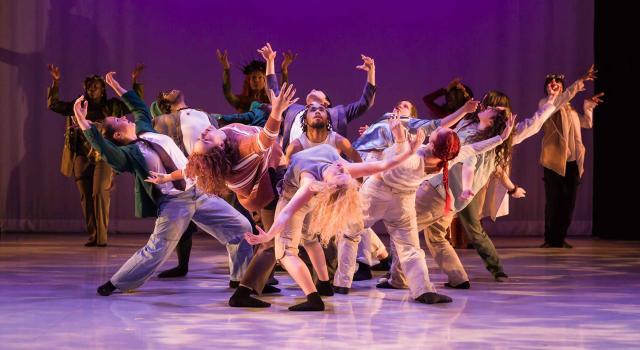Students from Havana Exchange Program Present Final Projects

Seven students who studied abroad in Cuba with the Hampshire in Havana spring exchange 2019 program presented their final projects at Hampshire’s 2019 Cuba Symposium, held on Tuesday, September 26.
Since 2000, this exchange program has immersed students from Hampshire and beyond in Cuban culture, connecting them with the creative community through partners in Cuba, and housing them with Cuban families. Students attend classes and complete independent projects while being tutored by Cuban professionals in their fields of interest. In return, the program brings Cuban artists and writers to Hampshire through the Visiting Cuban Scholars program.
On Tuesday, friends filled the East Lecture Hall of Franklin Patterson Hall, and Cuba committee reps Associate Professor of U.S. Literature and Cultural Studies Michele Hardesty and Director of Global Education Katie Irwin delivered the program’s opening remarks. Faculty and students also celebrated Professor of Law Flavio Risech-Ozegura’s retirement with a video of his former students honoring him.
The deadline for students to apply for Hampshire in Havana Spring exchange 2020 is Friday, October 11, 2019.
Excerpts of student project abstracts:
Haley Grey: “Body Speaks: A Journey through Voice and Prayer”
Tutors: Yanet Valdés, jazz vocalist, and Alejandro Meroño, composer and pianist
“During my three months in Cuba I studied with jazz vocalist Yanet Valdés and composer and pianist Alejandro Meroño to learn a mixture of traditional Cuban songs, Afro-diasporic chants, and two original songs based on my time here. Additionally, I learned about folktales and religious traditions of Yoruba origin, and these influenced the songs I wrote, as well as the experiences I shared with my tutors in Regla. This project culminated in a short video presentation of my rehearsal process and conversations with my tutors, one studio recording, and a final performance of all five songs.”
Gregg Bellón: “Ni adentro ni afuera: la maldita circunstancia del agua entre las dos partes”
Tutor: Osvaldo Hernández Menéndez, Professor of Cuban Studies and Film History, Instituto Superior de Arte; Assistant Director, Teatro “El Público”
“Packing my transcultural and theatrical weapons, I engaged in spirited combat on the following questions: How can the social progress and transformative power of the Revolution be reconciled against the loss it brought to so many individual families? How does revolution and its ideals continue to provide a road map for Cuba that offers possibilities for a harmonious future that isn’t devoid of struggle but that, at least, aims its ideological weapons towards the problems of scarcity, disenchantment, and desperation that threaten its legacy?”
Arianna Diaz-Celon: “A Study on How the Practices of Direction are transmitted to Generations of Women in Cuba”
Tutor: Vivian Martínez Tabares, Full Professor of Theater, Instituto Superior de Arte; Director of Theater Department and editor of Conjunto, Casa de las Américas
“Theater has a strong cultural presence in Havana. However, historically there have been gender disparities in relation to the role of the director. My research project addressed the reasons for these disparities while exploring the life and work of two Cuban women directors: Nelda Castillo and Yailín Coppola… With all the information I gathered, and after having attended over 20 plays — almost half of them directed by women — and after having read numerous articles and interviewed several directors, I made an artist book that highlights the story of these two women as well as the role played by other directors in the history of the Cuban theater.”
Emma Symanski: “Sequence: A Study of Actions and Reactions in Havana, Cuba”
Tutor: Nelson Ramirez de Arellano, Photographer; Director, Fototeca de Cuba
“The study of sequence is not a science, but it undeniably informs our understanding of how and why art may prompt a certain reaction and/or an emotional response from its spectators. To study sequence in Havana, Cuba, I visited museums, galleries, and individual art exhibitions, many during the 13th Havana Biennial... These curated forms of sequence have informed my own visual photography project, but so has every conversation, bus ride, and song I have heard. My final product is a sampling of photographic and textual sequences created after conducting research and observations in art and non-art spaces, including interviewing people about sequences in their lives, in Havana, Cuba. Every action has a reaction — whether curated or not.”
Annielly Camargo: “Lo que hay – Impreso al Sol”
Tutor: Eduardo Hernández Santos, Photographer, illustrator, and printmaker; Professor, National School of Fine Arts “San Alejandro”
“Blue is at the far edge of what can be seen, the color of the sky, or the color of the ocean. In her project series ‘Lo que hay — Impreso al Sol,’ Annielly Camargo used the photographic process of cyanotype, developing her prints with sunlight, along with color photography to look at the color blue as a metaphor for the distance between ‘us’ and the object of our desire. She created a series of seven mixed media installations and collage pieces using reclaimed wood, fabric, books, metal, recycled paper, photography, poetry, and people’s personal objects. Each piece represents one of six Cubans from various backgrounds and professions (from a poet to a school teacher to a knitter) whom she interviewed (and subsequently photographed)... Inspired by North American writer and historian Rebecca Solnit’s book A Field Guide to Getting Lost and Cuban poet Virgilio Piñeras ‘La isla en peso,’ Camargo’s pieces inquire about something that cannot exactly be measured and the ways in which the color blue relates to uncertainty and unknowing.”
Nina Barker: “Telenovela: Everyday Life and Verisimilitude”
Tutor: Sergio Pérez Hernández, Researcher, essayist, and scriptwriter; Professor of Latin American Literature, Instituto Superior de Arte
“My project in Cuba is a research paper that explores contemporary Cuban telenovelas and their audiences. I discuss how verisimilitude, meaning an internally coherent and plausible narrative, rather than a strict imitation of reality, is a key part of fiction and telenovelas. Considering that Cubans enjoy watching telenovelas that depict their daily lives, I explore how the recreation and representation of these daily lives in contemporary Cuban telenovelas might affect how their audience reacts to them and enjoys them. I argue that a telenovela should not recreate reality; rather, it should convince its audience of the truth of its world and story. I touch upon the knowledge and investment Cuban audiences have in telenovelas, which gives them a critical eye when watching them and discussing them… Alongside that, I also discuss the melodramatic roots of the genre, and how melodramatic literature can be a way to reinvigorate Cuban telenovelas… To support my argument, I used data from Instituto Cubano de Radio y Television’s Centro de Investigaciones Sociales, articles from experts on television and telenovelas, and interviews with experts in the Cuban telenovela field.”
Rosa Ramírez Mazaheri: “Ororó, Irawá: Four Voices of Cuban Contemporary Poetry”
Tutor: Margarita Mateo Palmer, Essayist, literary critic; Full Professor of Contemporary Latin American Narrative and Cuban and Caribbean Literatures, Instituto Superior de Arte
“In my field study project, I channeled my most intensive efforts into examining the work of four black Cuban women poets: Nancy Morejón, Georgina Herrera, Soleida Ríos, and Excilia Saldaña. A series of in-depth interviews with three of the living poets as well the reading of articles on their work and of course their poetry, formed the basis of a composite work that includes several analytical essays that delved into the poetic universe of these four women. Inspired by the magic of Georgina Herrera’s words that "poetry is like being possessed by a spirit," I put together a bilingual collection of my own poetry entitled Cayendo/Falling. The book consists of sixteen poems--ranging range from love, death, existential angst, family, indigeneity and my ancestors — and beautifully illustrated with original drawings by artist Eduardo Hernández.”
The Hampshire Cuba committee thanks program partner the Fundación Alejo Carpentier, the Hampshire in Havana Program Committee in Cuba, Roberto García, Aracelis “Gangy” García, and all of the tutors for their hard work and dedication to the Hampshire in Havana program. The event was sponsored by Hampshire’s Global Education Office.
2019–2020 Hampshire Cuba Committee
Michele Hardesty (Spring 2019 Faculty Director)
Associate Professor of U.S. Literatures and Cultural Studies, HACU
mlhHA@hampshire.edu
Roosbelinda Cárdenas (Spring 20 Faculty Director)
Assistant Professor of Anthropology and Latin American Studies, CSI
rcCSI@hampshire.edu
Margaret Cerullo
Professor of Sociology, CSI
mcerullo@hampshire.edu
Flavio Risech-Ozeguera
Professor of Law and Ethnic Studies, CSI
frisech@hampshire.edu
Carollee Bengelsdorf
Professor Emerita of Politics, CSI
cbengelsdorf@hampshire.edu
Jacqueline Hayden
Professor Emerita of Film and Photography, HACU
jhayden@hampshire.edu
Yaniris Fernandez
Associate Vice President of Academic Affairs
yfernandez@hampshire.edu
Katie Irwin
Director of Global Education/GEO Cuba Program Manager
kirwin@hampshire.edu
Photos by Jennifer Peña and Jason Drill



